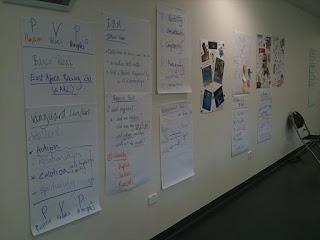


We have been approached several times over the past few weeks about assisting organisations with team building and a few thoughts on why there is such a growing urgency to create high functioning teams.
Most organisational structures include teams as a foundational part of business and yet sometimes we have seen levels of dysfunction that shock and dismay. We all have a picture in mind of those times when we have worked in teams where everyone is in flow, everyone has each others' back and where there is a strong sense of purpose. And these teams sure achieve beyond their expectations.
And we have also experienced those teams where the level of toxicity just streams through and where the percentage of 'walking dead' is higher than usual.
So not many people need convincing that teams that are highly functional perform well and achieve goals on a personal and a team level. The big question is - how do we get to that point and from our years of experience in working with teams in global organisations and in the public sector, these are some recommendations that we have:
1. We do see some value in one off bonding events such as looking for treasure hunts, building bicycles together or going on a rowing adventure. These events are not to be scoffed at and depending on how they are set up and debriefed, can achieve their aim of being fun, bonding and creating an atmosphere of goodwill. Team meals also create this same 'feel-good' factor and are useful if there is a celebration and an acknowledgement for team members.
2. To ensure that this feeling is sustained though, there needs to be a lot more effort placed in to the process and our experience has shown that by doing a serious and fun event, a great deal can be achieved.
Methodologies such as LEGO SERIOUS PLAY and Gamestorming are critically important processes to enable discussion and to get the conversation in to a blame-free zone where all contributions to the conversation are equally valued. By setting up the team builder as having definite outcomes that are measurable after the event.
Many of our top clients have structured sessions using these methodologies to ensure that they answer key questions in a consultative way. They play and they are creative in setting open and frank discussion as a value for the team.
Questions that guide and frame a team builder include:
- Who are we as a team?
- What do we do in relation to the larger organisation?
- What is the benefit of what we do?
- What is our branding as a team?
- Where do we stand at the moment? If we were to hold the mirror up to ourselves, what would we see? What do we think of ourselves and what do we imagine others are saying about us? What are our possible blind spots?
- Looking at our context, let's do a SWOT analysis
- What is possible in terms of what we can achieve?
- What is our 'BHAG' - big, hairy, audacious goal?
- What are the guiding principles that are going to move us forward?
- What are the key drivers that will create our success?
- How will we know that we are successful?
- How we will measure ourselves?
Going through the different layers of what teams need to do in order to reach peak performance includes looking at preferred behavioural styles and also doing some personal story telling.
As Lencioni puts it Trust is the key to everything and by knowing who is in the team, where they come from and what they represent, is a very strong way of creating that sense of trust.
Team building is what you make of it - and can be incredibly powerful if done with the right amount of planning and set up with the expectation of success.

No comments:
Post a Comment